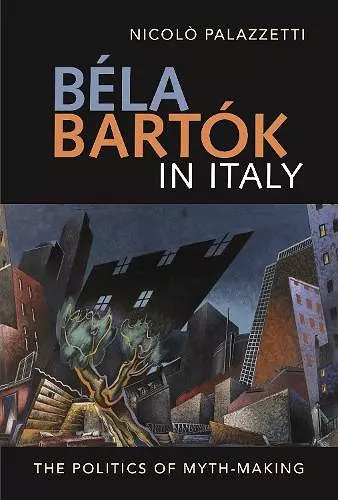Béla Bartók in Italy
The Politics of Myth-Making
Format:Hardback
Publisher:Boydell & Brewer Ltd
Published:20th Aug '21
Currently unavailable, and unfortunately no date known when it will be back

Examines the reputation of the Hungarian musician Béla Bartók (1881-1945) as an antifascist hero. This book examines the reputation of the Hungarian composer Béla Bartók (1881-1945) as an antifascist hero and beacon of freedom. Following Bartok's reception in Italy from the early twentieth century, through Mussolini's fascist regime, and into the early Cold War, Palazzetti explores the connexions between music, politics and diplomacy. The wider context of this study also offers glimpses into broader themes such as fascist cultural policies, cultural resistance, and the ambivalent political usage of modernist music. The book argues that the 'Bartókian Wave' occurring in Italy after the Second World War was the result of the fusion of the Bartók myth as the 'musician of freedom' and the Cold War narrative of an Italian national regeneration. Italian-Hungarian diplomatic cooperation during the interwar period had supported Bartok's success in Italy. But, in spite of their political alliance, the cultural policies by Europe's leading fascist regimes started to diverge over the years: many composers proscribed in Nazi Germany were increasingly performed in fascist Italy. In the early 1940s, the now exiled composer came to represent one of the symbols of the anti-Nazi cultural resistance in Italy and was canonised as 'the musician of freedom'. Exile and death had transformed Bartók into a martyr, just as the Resistenza and the catastrophe of war had redeemed post-war Italy.
Palazzetti takes up [an] important and ground-breaking study of Bartók in Italy. [...]. Exploring the roots of [Bartók's] canonization - the myth-making referred to in the book's subtitle - and its multiple political purposes, Palazzetti follows the trajectory of the composer's experiences and the popularity of his music before, during and after the fascist ventennio. [...]. The meticulously researched list of performances of Bartók's music from the very first, in 1911, to the end of 1950 is an invaluable resource, and reveals how often some of the most demanding works were played. [...]. The situation is one of condensed complexity, and Palazzetti is an excellent guide through its tangled paths. -- Kenneth Chalmers * OPERA *
True to the ethos of contemporary musicology, Palazzetti worries away at the parallelisms between the work of composers and the lives lived within cultures [...]. The very particular specifics of Palazzetti's material, so thoroughly researched and referenced in this book, raise many resonances, already debated by [...] Bartók scholars [...], as well as authors concentrating on Cold War cultural studies. -- Arnold Whittall * THE MUSICAL TIMES *
A well-researched study of how politics can try to hijack music. -- Susan Pierotti * Stringendo, Journal of the Australian Strings Association *
ISBN: 9781783276202
Dimensions: unknown
Weight: 557g
320 pages